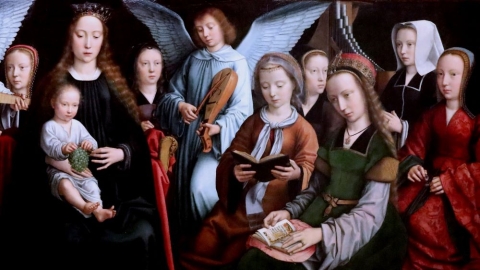Apostolic Exhortation in Honor of St. Thérèse of Lisieux

St. Thérèse
The Apostolic Exhortation C’est la confiance was published on October 15, 2023, on the feast of St. Teresa of Ávila, as “a way of presenting Saint Therese of the Child Jesus and the Holy Face [1873-1897] as the mature fruit of the reform of the Carmel and of the spirituality of the great Spanish saint [1515-1582],” Pope Francis explained.
Pope Francis had announced the document at a general audience on June 7, on the occasion of the 150th anniversary of the birth of St. Thérèse of the Child Jesus at Alençon (January 2, 1873) and of the centenary of her beatification (April 29, 1923).
In the Depths of Divine Mercy
In this short text of a dozen pages on confidence in the merciful love of God, the Supreme Pontiff recalls that St. Thérèse of Lisieux “was declared Venerable in 1921 by Pope Benedict XV, who, in praising her virtues, saw them embodied in her ‘little way’ of spiritual childhood.”
He explains, not without returning to some of his favorite themes: “In place of a Pelagian notion of holiness, [1] individualistic and elitist, more ascetic than mystical, that primarily emphasizes human effort, Therese always stresses the primacy of God’s work, his gift of grace.”
“For Therese, the one God is revealed above all else in his mercy, which is the key to understanding everything else that can be said of him: ‘To me he has granted his infinite mercy and through it I contemplate and adore the other divine perfections! All of these perfections appear to be resplendent with love, even his Justice (and perhaps this even more so than the others) seems to me clothed in love’. [2]
“This is one of the loftiest insights of Therese, one of her major contributions to the entire People of God. In an extraordinary way, she probed the depths of divine mercy, and drew from them the light of her limitless hope.”
Evoking the great love of St. Thérèse for the Church, the Pope quotes a page from her autobiographical Manuscript B: “Considering the mystical body of the Church I had not recognized myself in any of the members described by Saint Paul [I Cor. 12-13], or rather I desired to see myself in them all. [...]
“I understood it was love alone that made the Church’s members act, that if Love ever became extinct, apostles would not preach the Gospel and martyrs would not shed their blood. I understood that Love comprised all vocations, that love was everything, that it embraced all times and places [...] Yes, I have found my place in the Church, and it is you, O my God, who have given me this place; in the heart of the Church, my Mother, I shall be Love.”
And Francis comments: “This heart was not that of a triumphalistic Church, but of a loving, humble and merciful Church. [...] This discovery of the heart of the Church is also a great source of light for us today. It preserves us from being scandalized by the limitations and weaknesses of the ecclesiastical institution with its shadows and sins, and enables us to enter into the Church’s ‘heart burning with love’, which burst into flame at Pentecost thanks to the gift of the Holy Spirit.
“It is that heart whose fire is rekindled with each of our acts of charity. ‘I shall be love’. This was the radical option of Therese, her definitive synthesis and her deepest spiritual identity.”
Pope Francis Quotes Himself
The Pope continues by quoting his previous Apostolic Exhortations Evangelii gaudium (November 24, 2013) and Gaudete et exultate (March 19, 2018): “In a missionary Church, ‘the message has to concentrate on the essentials, on what is most beautiful, most grand, most appealing and at the same time most necessary. The message is simplified, while losing none of its depth and truth, and thus becomes all the more forceful and convincing’. [3]
“The luminous core of that message is ‘the beauty of the saving love of God made manifest in Jesus Christ who died and rose from the dead’. [4] Not everything is equally central, because there is an order or hierarchy among the truths of the Church, and ‘this holds true as much for the dogmas of faith as for the whole corpus of the Church’s teaching, including her moral teaching’. [5]
“The centre of Christian morality is charity, as our response to the unconditional love of the Trinity. Consequently, ‘works of love directed towards one’s neighbour are the most perfect manifestation of the interior grace of the Spirit’. [6] In the end, only love counts.”
He expounds: “The specific contribution that Therese offers us as a saint and a Doctor of the Church is not analytical, along the lines, for example, of Saint Thomas Aquinas. Her contribution is more synthetic, for her genius consists in leading us to what is central, essential and indispensable.
“By her words and her personal experience she shows that, while it is true that all the Church’s teachings and rules have their importance, their value, their clarity, some are more urgent and more foundational for the Christian life. That is where Therese directed her eyes and her heart. [...]
"Indeed, ‘to recognize the word that the Lord wishes to speak to us through one of his saints, we do not need to get caught up in details… What we need to contemplate is the totality of their life, their entire journey of growth in holiness, the reflection of Jesus Christ that emerges when we grasp their overall meaning as a person’. [7] This is all the more true in the case of Saint Therese, since we are dealing with a ‘Doctor of synthesis’.”
Related Article:
Pope Benedict XV Recalls the Qualities of Spiritual Childhood
It is fitting to add to these remarks those given on the occasion of the Promulgation of the Decree Concerning the virtues of the Venerable Thérèse de L’Enfant Jésus on August 14, 1921. [8] Pope Benedict XV said: “It will not be out of place to enumerate the qualities of this spiritual childhood, both as regards what it omits and what it includes.
“It knows nothing of self-pride, or the thought of being able to attain by purely natural means a supernatural end, or those spurious notions of self-reliance in the hour of danger and temptation. On the other hand, it presupposes a lively faith in the existence of God, a practical homage to His Power and Mercy, a confident recourse to the Providence of Him who alone can give us grace to avoid evil and seek good.
“Thus, whether regarded from the negative or the positive point of view, the qualities which comprise spiritual childhood evoke our admiration, and enable us to realize why Our Lord Jesus Christ pointed to it as a necessary condition for obtaining eternal life. [...]
“But do not the words of the Divine Master: ‘Unless ye be converted and become as little children, [you shall not enter into the kingdom of Heaven]’ [Mt. 18:3] indicate the necessity of a change, and, consequently, the effort to effect that change? [...] for it is obvious that a man must work to become that which he has never been, or, which he has ceased to be. [...]
“Since it is impossible for a man never to have been a child, the words ‘Unless you become as children’—carry with them the obligation to labour to regain the lost qualities of childhood. It would be absurd to dream of the possibility of resuming either the outward appearance or feebleness of the state of infancy, but it is not unreasonable to discern, in the words of the Gospel, a counsel given to those who have attained maturity to return to the virtues associated with spiritual childhood.
“In the course of centuries, fresh force was given to this teaching by the example of those who attained the perfection of Christian heroism through practising these very virtues.”
“She pictured to herself the ever-docile Child of Bethlehem in the arms of His most holy Mother, ready to let Himself be borne from Bethlehem to Egypt, and from Egypt to Nazareth. Thérèse, in her turn, placed herself in the arms of the holy rule of Carmel, allowing herself to be guided in everything by religious obedience. With the eyes of her soul, she saw the Divine Worker of Nazareth always fulfilling tasks allotted to Him by His adopted Father, always submissive to those who stood to Him in the place of His Heavenly Father.
“In imitation of His example, Thérèse diligently carried out the orders of her Prioress and Novice Mistress, and this she did perfectly, without complaint or remark of any nature, as though possessing no will of her own.”
The Pontiff then urges the faithful to develop “the firm resolution to imitate the new heroine. Duplicity and crafty stratagem are only too characteristic of the day. It is not, therefore, to be wondered at that piety towards God, and charity towards one’s neighbour, should so have waned. May all this soon be changed!
“To the deceits, the fraud, the hypocrisy of the world, may there be opposed the sincerity of a child. With this sincerity, under the guidance of the Carmelite of Lisieux, may there be also cultivated the habit of always walking in the presence of God, and the resolution to let oneself be guided by the hands of His divine Providence.”

Basilica of Sainte-Thérèse
Pope Pius XII: Model of Humility, Confidence, and Love
We conclude here with the address of Pope Pius XII, delivered in a radio message on July 11, 1954, on the occasion of the consecration of the Basilica of St. Thérèse of Lisieux. “It is firstly a message of humility! What a strange message to appear in the midst of a world occupied with itself, with its scientific discoveries, its technical advancements—the radiance of a young woman who is not distinguished by any incredible feat, any worldly accomplishment.
“With an absolute rejection of earthly grandeur, the renunciation of her liberty and the joys of life, the painful sacrifice of the most tender affections, she stands as a living antithesis to all the world’s ideals.
“When different peoples and social classes distrust or turn against each other for economic or political advantage, Thérèse of the Child Jesus appears empty-handed: fortune, honor, influence, temporal gain—nothing tempts her, nothing appeals to her save God alone and His Kingdom. [...]
“She says to them with Christ: ‘Enter ye in at the narrow gate: for wide is the gate, and broad is the way that leadeth to destruction, and many there are who go in thereat. How narrow is the gate, and strait is the way that leadeth to life: and few there are that find it!’ [Mt. 7:13]
“The gate—narrow, it is true—but accessible to all, is that of humility. [...] It is the Gospel itself, the heart of the Gospel, which she found, but with such charm and freshness. ‘Amen I say to you, unless you be converted, and become as little children, you shall not enter into the kingdom of heaven.’ [Mt. 18:3] Do not rely on strength, wealth, intelligence, and any other human resource.
“Seek the one thing necessary. Accept the yoke of the Lord, sweet and light; acknowledge His sovereign reign over your persons, your families, your associations, your nations. Accept and practice His law of fraternal charity and you will know peace and tranquility. By renouncing the illusory pillars of a wholly material civilization, you will find the true security that God gives to those who adore none but Him.
“Can the men of today—stained with so many defects, weighed down by their egotism—still hope to straighten themselves out, to shake off the bonds of their moral obstacles and walk toward God? Doesn’t the Lord despise such cowardice and divisiveness, such avarice and sensuality? Let Thérèse herself give the answer!
“She also asserts, confident in conveying the disposition of the heavenly Father: ‘Yes, I feel it; even though I had on my conscience all the sins that can be committed, I would go, my heart broken with sorrow, and throw myself into Jesus’ arms, for I [9] know how much He loves the prodigal child who returns to Him. It is not because God, in His anticipating Mercy, has preserved my soul from mortal sin that I go to Him with confidence and love….’ [10]”
Pope Pius XII concludes with a prayer: “O St. Thérèse of the Child Jesus, model of humility, confidence, and love, from your arms in heaven above let fall upon mankind a shower of roses: the rose of humility, that they may crush their pride and accept the yoke of the Gospel; the rose of confidence, that they may abandon themselves to the will of God and rest in His mercy; and lastly, the rose of love, that they may be opened to grace beyond measure that they may fulfill the unique end for which God created them in His image: to love Him and to make Him loved.”
[1] Cf. Apostolic Exhortation Gaudete et exsultate (19 March 2018), 47-62: AAS 110 (2018), 1124-1129
[2] St. Thérèse of the Child Jesus and the Holy Face, Ms A, 83v: Story of a Soul, p. 180. The English citations of the Saint’s writings quoted by Pope Francis in his Apostolic Exhortation are taken from the translations of her works published by the Institute of Carmelite Studies (ICS), Washington, D.C.: Story of a Soul (1996); Letters I: 1877-1890 (1996); Letters II: 1890-1897 (1988); Prayers (1997); Poetry (1996); Her Last Conversations (1977).
[3] Apostolic Exhortation Evangelii Gaudium (24 November 2013), 35: AAS 105 (2013), 1034.
[4] Evangelii gaudium., 36: AAS 105 (2013), 1035.
[5] Evangelii Gaudium.
[6] Evangelii gaudium., 37: AAS 105 (2013), 1035.
[7] Gaudete et exsultate, 22: AAS 110 (2018), 1117.
[8] The English translation of this is taken from Sœur Thérèse of Lisieux, The Little Flower of Jesus: A New and Complete Translation of L’Histoire d’Une Âme, with an Account of Some Favours Attributed to the Intercession of Sœur Thérèse. Edited by T. N. Taylor, priest of the Archdiocese of Glasglow and witness before the Tribunal of Beatification. London: Burnes, Oates & Washburne, 1922, pp. 437-448.
[9] Letter of Mme. Martin to Pauline, November 8, 1876.
[10] St. Therese of Lisieux. Story of a Soul: The Autobiography of St. Therese of Lisieux (the Little Flower) [The Authorized English Translation of Therese's Original Unaltered Manuscripts] (p. 278). ICS Publications. Kindle Edition.
(Sources : vatican news/vatican.va/carmel de Lisieux/DICI n°438- FSSPX.Actualités)
Illustration 1 : domaine public
Illustration 2 : © Raimond Spekking





